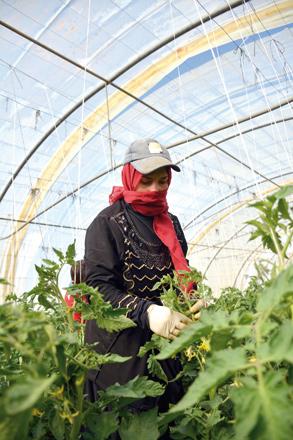- Local News
- Mon-2020-12-28 | 02:41 pm

The rights of women in the agricultural sector are the ones "most violated”, said activists, who have been calling for the "just treatment” of female workers.
Calling for better working conditions, pay and safety standards, director of NGO Tamkeen for Legal Aid and Human Rights Linda Kalash said that women workers in the agricultural sector "do not enjoy any kind of insurance, especially social and health insurance”.
The importance of having insurance was highlighted in light of a recent incident in which a female farm worker died in a traffic accident while she was about to board a minibus with her colleagues in the Ghor Al Safi area.
Kalash said that reports prepared by the NGO confirm that women farmers are particularly exposed to violations, most important of which is their low wage, which ranges from JD1 to JD1.5 per day.
In addition to low wages, Kalash noted that safety and occupational health conditions such as proper clothes, footwear, masks and gloves are "almost non-present, although they are necessary for protecting workers from difficult working conditions”.
She also highlighted "the failure of most employers to provide decent transportation for workers to and from their place of work”, adding that workers are "often transported by improper means of transport originally intended for the transport of tools and agricultural materials”.
President of the Specific Union for Farmer Women in Jordan Zeinab Momani said that women farmers in Jordan are "exposed to a number of social, economic, institutional and legal restrictions that result from the lack of opportunities in the sector as well as other obstacles that hinder them from achieving economic independence and gender equality”.
"Although women in agricultural societies play an important role in production and household security, their wages are barely equivalent to a quarter of the wage that men receive for the same task,” Momani said.
She pointed out that although women farmers contribute to family income, "they are rarely consulted about issues related to them, such as applications for loans and the management of financial matters”.
In addition to the limited access to loans due to the lack of land ownership by women farmers, Momani said that they also "do not have contracts with the farm owners, so they are always under their control and sometimes are forced to overwork to the point of enslavement”.
"The exploitation of the poor and vulnerable who are looking for income to secure food for their children should be immediately addressed,” she added.









